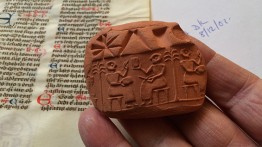Ewan Clayton: What Is Writing?
Monday, June 20, 2016, 6:30 - 8pm

In this free, public lecture Ewan Clayton will ask if writing will survive the digital transformation of our culture and, more fundamentally, what is writing and what work does it do for us? He sets in context the various crises that surround the order of the written word. Drawing on his previous experience as a consultant to Xerox PARC (the lab where much of our current information technology was first conceived), Ewan will argue that we have under-conceived what writing is: it is irreducibly pluralistic in nature and not to be equated with any one technology. If true this has implications for how we read the future and for how we educate ourselves as literate citizens.
The lecture is free, but registration is requested.
Ewan is a calligrapher and part-time Professor in Design at The University of Sunderland where he co directs the International Calligraphy Research Centre. He grew up associated with a community of craftsmen at Ditchling in Sussex founded by Eric Gill. Ewan has enjoyed a varied professional career working as both a calligraphy teacher and a consultant to Xerox PARC, and he is currently a core faculty member at the Royal Drawing School in London. In 2013 he was awarded the first Karl-Georg Hoefer prize by The Schreibwerkstatt Klingspor for his work in calligraphy and education. His book on the history of calligraphy and typography The Golden Thread is out in paperback this year in the USA and has recently been released in Spanish and Italian translations.
This lecture is part of the Herb Lubalin Lecture Series of Type@Cooper. The series is sponsored by the Herb Lubalin Study Center of Design and Typography at The Cooper Union, a public graphic design archive which places emphasis on a hands-on access to a wide range of design and typography ephemera.
Located in the Frederick P. Rose Auditorium, at 41 Cooper Square (on Third Avenue between 6th and 7th Streets)




